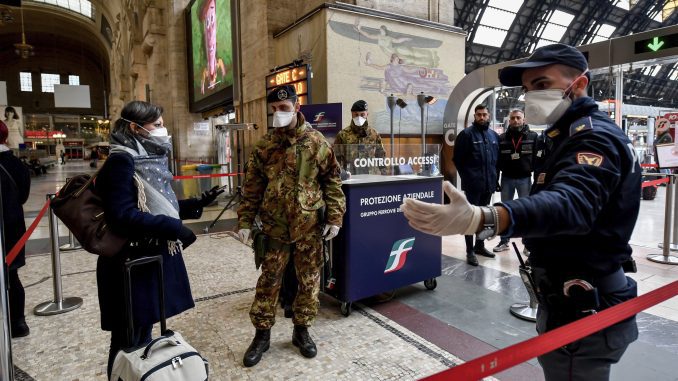
SOAVE, Italy — Anxiety over the new coronavirus epidemic sent global stock markets and oil prices plunging Monday and caused a cascading shutdown of sites and events ranging from the Sistine Chapel to Saudi schools to a Holocaust march.
While many of Beijing’s white collar workers returned to work as new cases of infection subsided in China, some 16 million people under a widespread lockdown in northern Italy struggled to figure out the new rules of their daily existence.
Global oil prices suffered their worst losses since the start of the 1991 Gulf War. In Saudi Arabia, shares of state oil giant Saudi Aramco dropped 10%, forcing a halt to trading of the company on Riyadh’s stock exchange.
Travelers at Milan’s main train station had to sign police forms self-certifying that they are traveling for “proven work needs,” situations of necessity, health reasons or to return home. They also needed to provide identity documents, contact numbers and an exact reason for travel.
Italy’s financial hub of Milan and its popular tourist city of Venice were among the places under the quarantine lockdown. Across Italy, museums and archaeological sites were closed, weddings were canceled and restaurants were told to keep patrons a meter (3.3 feet) apart. The country has counted 7,375 cases of COVID-19 virus and 366 deaths, more than any country outside of Asia.
Pope Francis celebrated Mass by himself Monday at the Vatican hotel where he lives, live-streaming the event, but resumed some meetings.
China’s slow re-emergence from weeks of extreme travel restrictions offers a grim sense of the longer-term effects the virus can have on a country’s economy.
“Our business is one-fifth of what it was before,” said Cheng Sheng, who helps run a stand in Beijing that sells sausages and noodles. “There’s much less foot traffic. There are no people.”
Infections were reported in more than half the world’s countries and flashpoints were erupting around the globe. In all, more than 110,000 people have tested positive for the disease and more than 3,800 people with the virus have died around the world, most of them in China. Some 62,000 people have already recovered.
In Iran, state television said the virus had killed another 43 people, pushing the official toll up to 237 with 7,161 confirmed cases. But many fear the scope of illness is far wider there.
In the United States, where more than 500 infections have been reported, attention was fixed Monday on cruise ships on opposite sides of the country that were kept at bay over fears of virus threats.
The Grand Princess cruise ship, which has at least 21 confirmed virus cases, was expected to dock in Oakland, California, amid elaborate anti-coronavirus protective procedures. Fleets of buses and planes were ready to whisk the more than 2,000 passengers to military bases or their home countries for a 14-day quarantine.
In Florida, passengers were disembarking from the Regal Princess after it received clearance to dock. Two crew members eyed as possible carriers had negative tests for the virus.
The Caribbean Princess cruise ship, meanwhile, cut short a Fort Lauderdale-Mexico cruise because crew members had been on another ship where people were infected.
Countries around the world showed a willingness to take tough steps to try to stop the virus’ spread.
After earlier closing off its land borders, Saudi Arabia cut off air and sea travel to and from Bahrain, Egypt, Iraq, Italy, Kuwait, Lebanon, South Korea, Syria and the United Arab Emirates. All Saudi schools and universities were closing beginning Monday.
Qatar cut off travel to 15 countries and announced it would shut down schools and universities beginning Tuesday.
The Czech Republic banned visits to hospitals and retirement homes and began random checks on vehicles arriving at border crossings, including taking the temperatures of occupants.
Organizers of the annual Holocaust remembrance march in southern Poland postponed the event this year due to coronavirus fears, and authorities in Germany announced that a Bundesliga soccer match Wednesday between FC Cologne and Borussia Moenchengladbach will take place with no fans.
China reported 40 new cases of the virus Monday, its lowest number since Jan. 20. More than three-quarters of the country’s surviving virus patients have been released from treatment. South Korea reported 165 more cases Monday, bringing its total to 7,478.
Albania announced its first COVID-19 cases, a father and son who had returned from Italy, and the president of the Philippines declared a public health emergency.



